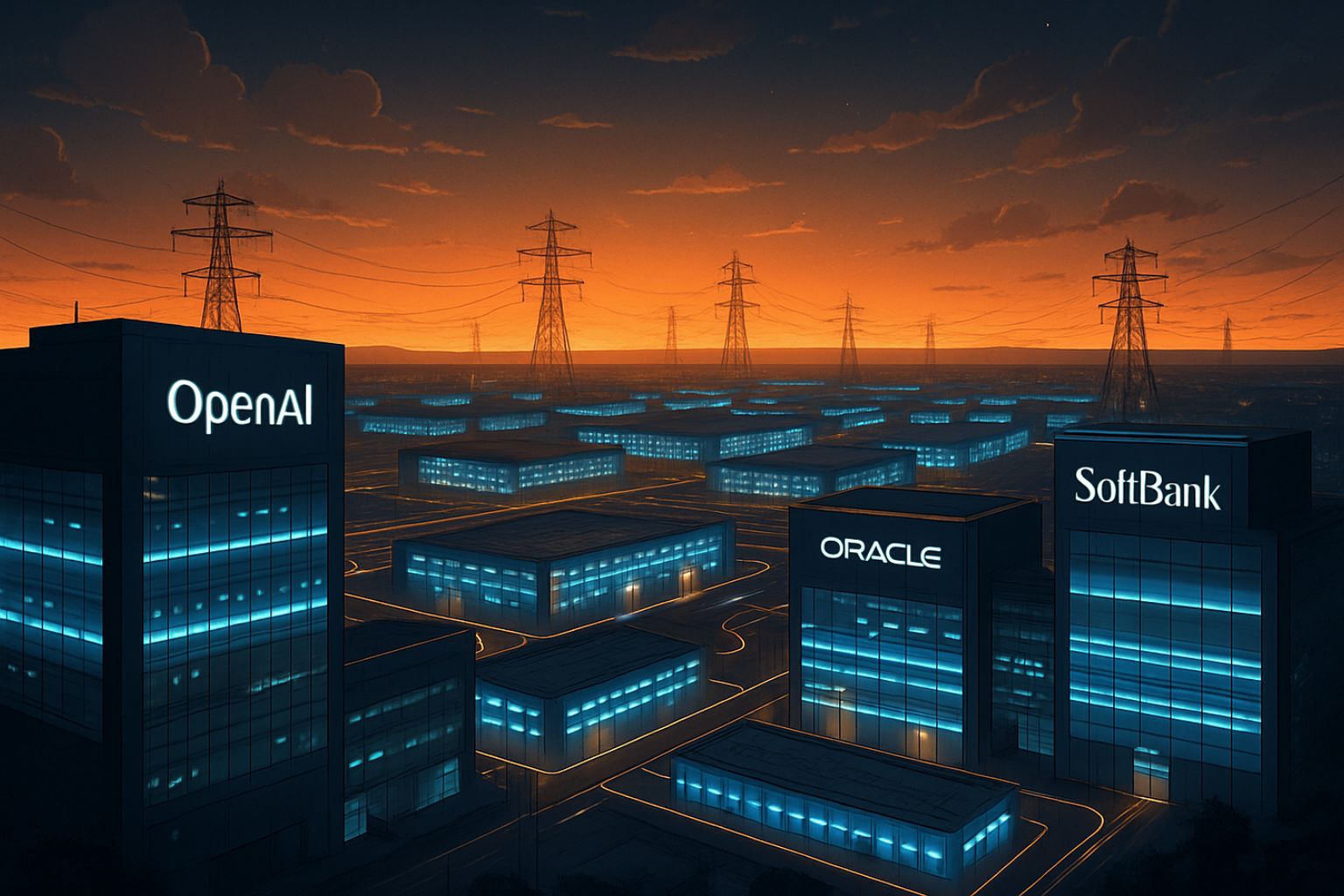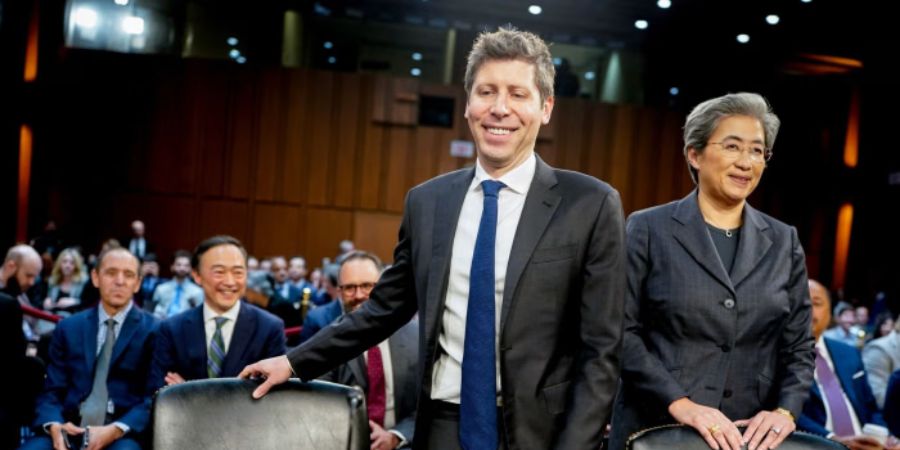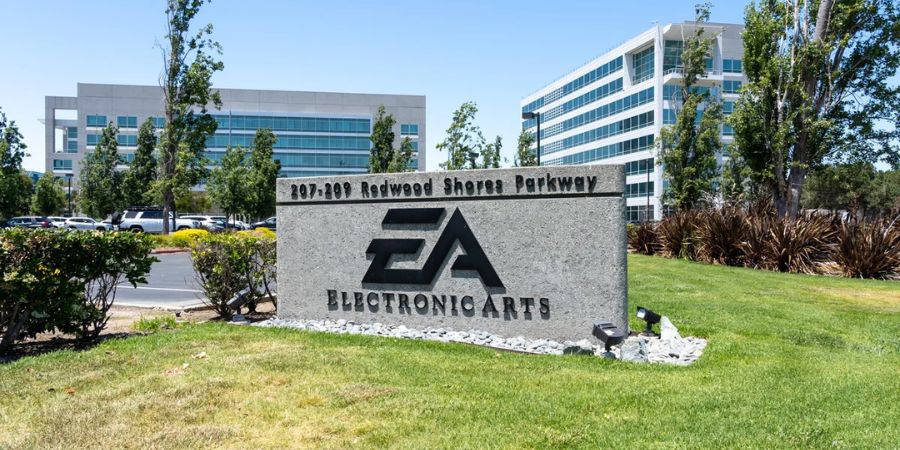The partnership between OpenAI, Oracle and SoftBank has taken a dramatic leap forward. Their joint Stargate plan, already one of the most ambitious undertakings in the technology sector, will now add five new AI data centers 2025 across the United States. With a projected price tag of $500 billion Stargate AI project, this initiative is being described as nothing short of historic.
The plan is not just about adding infrastructure. It is about rewriting the rules of artificial intelligence itself. The partners envision a future where AI runs on a global data centers grid of super-powered compute hubs, pushing the boundaries of what machines can process, analyze, and create. In scale and ambition, few projects in history come close.
Where the Centers Will Rise
The scale of this rollout stretches across multiple states.
OpenAI and Oracle will establish three AI data centers in Shackelford County, Texas; Dona Ana County, New Mexico; and an undisclosed site in the Midwest.
OpenAI, SoftBank, and a SoftBank affiliate will build two more in Lordstown, Ohio and Milam County, Texas. This SoftBank OpenAI Oracle technology collaboration underscores how the alliance is expanding reach across the country.
These facilities will join the already operational Abilene, Texas site and ongoing projects with CoreWeave, creating a web of AI infrastructure across the nation. Each of these sites will not just house machines. They will become power plants of intelligence, capable of handling workloads that dwarf anything the world has seen before.
By the time construction wraps up, the Stargate plan aims to approach 7 gigawatts of computing capacity in the next three years. That number is staggering. For comparison, 7 gigawatts rivals the total electricity consumption of small countries. The original goal is 10 gigawatts, and with the momentum now building, the partners believe they are closing in fast.
More Than Just Machines
Sam Altman, CEO of OpenAI, described the mission in simple words: “AI can only fulfill its promise if we build the compute to power it.” The simplicity of that statement hides the enormity of what is being attempted. Without vast AI infrastructure, even the most advanced AI models remain trapped in theory. The Stargate plan is about unleashing that potential.
The impact will not stop at machines. The initiative is expected to generate 25,000 on-site jobs, revitalizing local economies, and putting towns like Lordstown and Milam County on the global data centers map. It represents not just technological progress but also economic transformation.
Fueling the AI Revolution
The financial backbone of Stargate plan is equally bold. Instead of relying solely on upfront cash, the project will lean heavily on debt financing, a strategy that allows rapid deployment while spreading the cost across decades. It is a high-risk, high-reward play that signals how confident the backers are in AI investment and its long-term profitability.
Nvidia, a cornerstone of the AI hardware world, has already pledged up to $100 billion in investment in OpenAI, and will continue supplying the advanced chips essential for these AI data centers. Without Nvidia’s silicon, none of this would be possible.
Meanwhile, Microsoft, another key backer of OpenAI, is also deeply embedded in this ecosystem. Together, these companies are shaping a future where AI infrastructure is as critical as highways, airports, and power grids. This technology partnership demonstrates how strategic alignment fuels AI expansion on a global scale.
Risks, Challenges, and Global Stakes
A project of this size is not without hurdles. Power supply, water usage, environmental impact, and regulatory approvals all stand as significant challenges. To operate at full scale, Stargate plan facilities will need to draw from massive renewable energy sources, pushing the boundaries of what regional grids can support.
The global implications are just as profound. In a world where AI is increasingly tied to national security, these AI data centers become strategic assets. Rival powers, especially China, are building their own global data centers ecosystems, and the race to control AI infrastructure is rapidly turning into a geopolitical competition.
If the Stargate plan succeeds, the U.S. could cement its dominance in AI for decades. If it stumbles, the gap could close quickly, shifting the balance of technological leadership.
A Defining Moment for AI
The Stargate plan expansion is more than a construction project. It is a statement of intent. It says that AI is not just a passing trend or a product category. It is the next great industrial revolution, and it demands an AI expansion to match.
The price tag of half a trillion dollars might seem unbelievable. The timelines may look impossibly ambitious. Yet every breakthrough in history has carried the same mix of doubt and audacity. The $500 billion Stargate AI project is the moonshot of the AI era, and its outcome will shape not just technology but the trajectory of economies, governments, and societies worldwide.
In this story, the AI future with OpenAI and Oracle and the SoftBank OpenAI Oracle technology collaboration represent a shift toward alliances that can build OpenAI Oracle SoftBank AI data centers at a scale never attempted before. These partnerships combine AI investment, technology partnership, and AI expansion to create global data centers that could define the next century.
The ambition of building five new AI data centers 2025 is not just about powering AI today, but securing the AI future with OpenAI and Oracle tomorrow. The OpenAI Oracle SoftBank AI data centers alliance shows how AI infrastructure at massive scale, backed by AI investment, is setting the stage for generations to come.
Read Also: Cloud Computing vs Traditional IT: Why Startups Should Choose the Cloud








